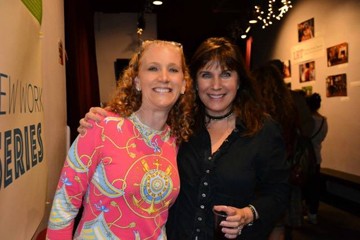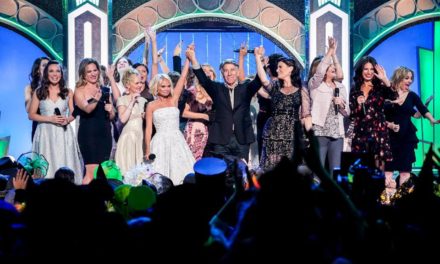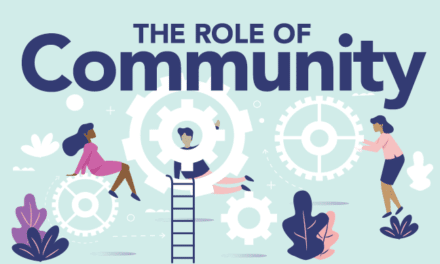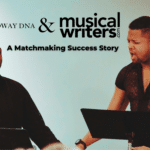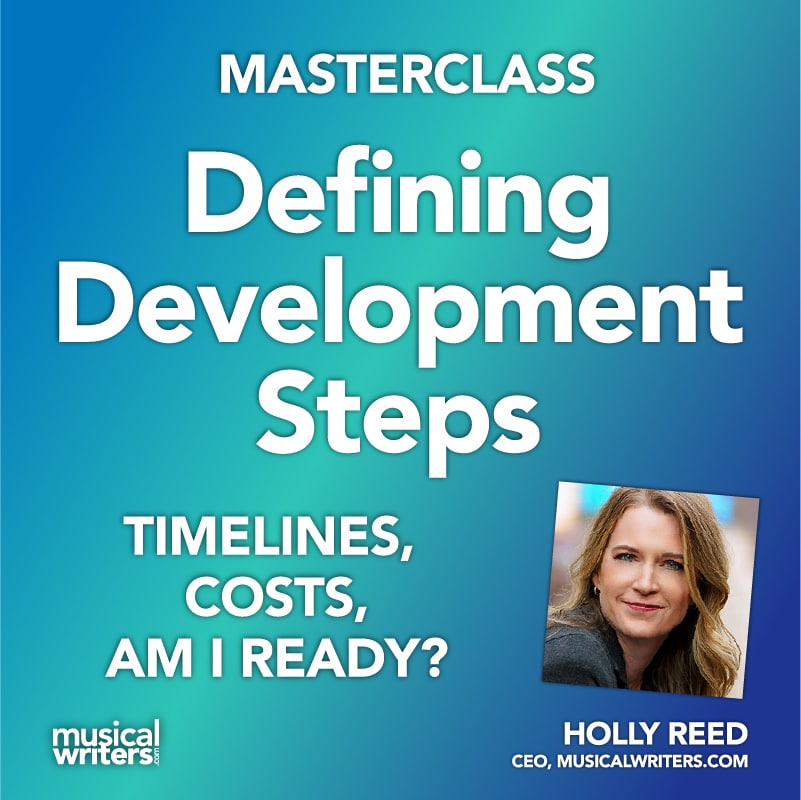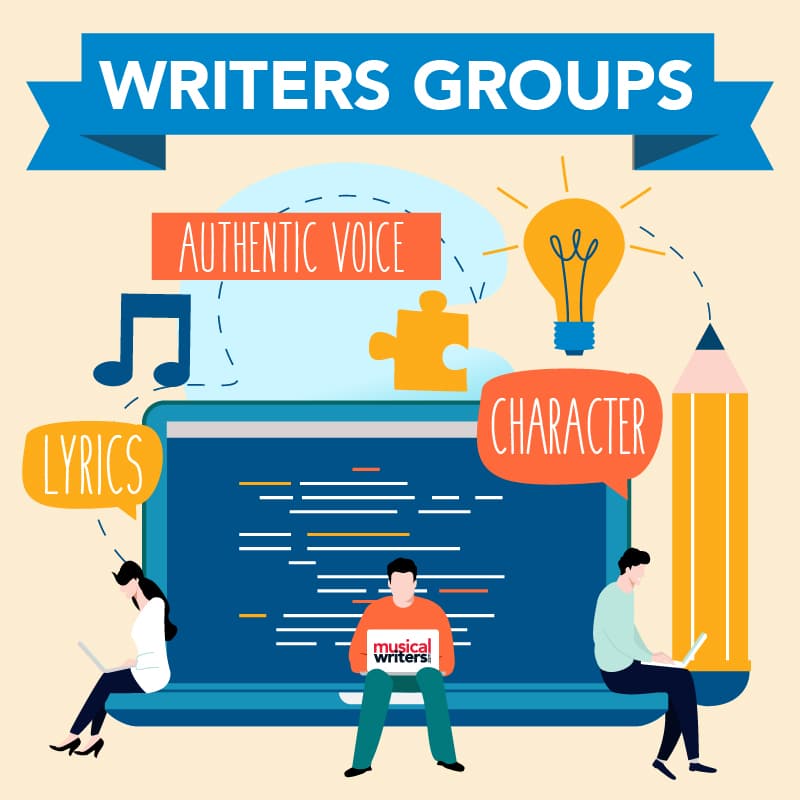I was so honored to be the guest of Jean-Paul Yovanoff on “Be Our Guest,” a podcast by Musical Theatre Radio. Musical Theatre Radio is dedicated to playing stage shows from the musical theatre repertoire ranging from the 1890’s to now. MTR plays shows that are both popular and rare, exposing the listening audience to a broad range of productions from around the world with a focus on supporting new works.
During this interview, I was able to share a little of the history of MusicalWriters.com, some of my own musical-writing journey, a few of the programs we offer, and my heart and vision for the MusicalWriters.com community. To say I was excited is an understatement, and if you listen, you can see how excitement definitely ups my (spoken) words-per-minute. (It does this with my written word as well, and that’s a good thing!). Here’s the transcript from the podcast:
Jean-Paul Yovanoff: Good day, everyone. Hello, all my friends and welcome back to another episode of Be Our Guest here on Musical Theater Radio. I am your host once again, John Paul Yovanoff, and we are speaking with a new person that I’ve just met, which is fantastic. I’d been to their website lots of times but I’m so excited to learn more about what they offer and what they can do to help all of our listeners out there in the world for Musical Theater Radio. So today I’d love to introduce to everyone, Holly Reed, who is the owner and—I love this—Chief Excitement Officer of the website, MusicalWriters.com. Hello, Holly. Welcome aboard. Thank you very much for agreeing to come on and talk.
Holly Reed: Thanks for letting me do it! I’m excited!
Jean-Paul: I can’t wait to let everybody know about your site if they don’t know about it. We always start with the 30-second bio. Give us your 30-second bio, Holly.
Holly: Professionally, I’m a graphic and web designer. I have my own business, Reed Creative Group, that I’ve had for about 15 years. I’m kind of a solo-preneur and have clients all over the country. I have always been a vocal performer and have just written a musical. So all of those worlds have now collided into MusicalWriters.com.
Jean-Paul: Very nice. As long as you don’t look at my website, we’re okay. I already know it needs some help, but you’ve got to start somewhere, right? Let’s delve right into the beginning. How did you get interested in musical theater in the first place?
Holly: Well, this is probably a disappointment to many. Either that or it’s a very common story. I just went to a Broadway show in New York—Wicked—and completely got bitten by the bug. I left wanting to be in that world as much as possible. I loved the connection. I’ve always been a vocal performer, and my husband is a worship pastor, so we have been involved in leading churches for a long time. Being in the theater and having these characters on stage that communicate with the audience this amazing story—it was relatable and was life-changing. I thought, okay, this is a new way to really connect with audiences by taking on these new roles and new characters. I left the theater wanting to be a part of that world (so Little Mermaid). That was about 10 years ago.
Jean-Paul: Very nice. For some people, it is a common story. People go to see a show and then fall in love. It’s either that or “I’ve been growing up with it because of my parents since day one.”
Holly: Right. I did not have that.
Jean-Paul: So you went to see a show and then you decided, I’m going to start writing shows?
Holly: Well, I first wanted to start acting in shows, so I immediately went home and enrolled in acting and dance classes. I was already in vocal coaching, so I ramped that up to this new genre, and then just started being in shows. First, I was Nancy in Oliver and fell in love with performing in that capacity. As time went on, I thought I might want to write something. I had directed a lot of children’s musicals prior to that, so I was familiar with directing and how shows worked in general. I’m kind of an “if I haven’t done it, I want to try it” kind of person. I live to try new things. I thought, “okay, we’re just going to try to write something.”
Jean-Paul: Wow. So Wicked was very influential on you.
Holly: It very much was, yes. I started reading everything that I possibly could. I started scouring the internet for resources and came across, Carol de Giere’s site, MusicalWriters.com and loved the content. She is very connected with Stephen Schwartz and obviously Steven Schwartz is very connected with Wicked. That was kind of a match made in heaven. I’ll stop there and let you guide from here. I can tell that whole story, but we’ll see what else you have for me.
Jean-Paul: You know what? The nice thing about this is I treat the station like live theater, whatever happens, happens. If we happen to go in this direction, let’s go! My question is now, have you gotten to meet Stephen Schwartz?
Holly: Yes, absolutely.
Jean-Paul: And you told him how Wicked was so influential to you?
Holly: A little bit, not a lot. I actually was really honored [to do something for Stephen] this past fall. Carol wrote the book Defying Gravity, which is Stephen’s biography. She released a new edition to add some of his newer work and new interviews and content. I was honored to be the cover designer for that edition. That was super exciting. Those worlds have really collided and it has really been a fun ride.
Jean-Paul: Cool. I would have gone into how you started doing MusicalWriters.com. So continue.
Holly: My husband and I write together. I am book and lyrics and kind of a “melodist.” I’m not really a composer per se. I do play the piano, but he is more of the full-blown composer. He and I wrote this Christmas show (our first) and did a small production of it several years ago. It (my writing) was horrible. I thought, “Oh my gosh, this is terrible.” The music was great, but the storyline was fragmented and the story arc was a mess. Later that Christmas season, I was reading Carol’s email newsletter from MusicalWriters.com. At the bottom of the newsletter it said, “email me if you have any questions” or something like that.
I thought, “you know what, I’m going to do that.” I emailed her and said, “I am a graphic and web designer, and I have also written a show. I know that you have a wealth of expertise and have seen all of the resources that you have available, but I think the website design doesn’t do the site justice. It is a fabulous site, but I think it can be brought forward to reach more audiences and be a little bit more user friendly. I don’t know if you’d be interested in swapping work, but I would love for you to look at our show and give me some of your feedback, and I would be happy to take a look at redesigning your site.”
She loved that idea, and I could say the rest is history. We started working together, and eventually she decided that the site was a little too much for her to maintain. So, she turned it over to me because she thought I had a great vision for it. She is still very much a part of the site as a contributor and sounding board, but she doesn’t have the full responsibility anymore. I think that’s been easier on her. So that’s how all of that came to be.
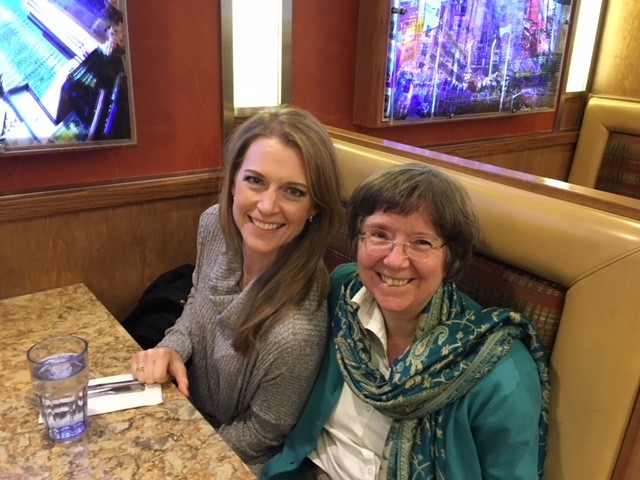
Holly Reed and Carol de Giere catching up and sharing dreams in 2018
Here’s my heart for MusicalWriters.com: As we were writing our show, I was scouring the internet for resources and books and anything that I could learn about musical writing. I found that there were things out there, but not a lot of resources all in one place. Once we got our show a little tighter, finding submission opportunities was a headache. I would Google and Google and Google, but many of the theatre submission sites were for plays only. There were a lot of dead ends. I would stumble onto something and then find out it was only for plays. The more robust entities [for submission opportunities] such as the Dramatists Guild or Play Submission Helper combine plays and musicals. I really had to weed through all of that. I thought, what if I can help other people weed through that…I’m doing the work anyway. I’ll curate it and make that a little easier.
Jean-Paul: What you have done is fantastic. Let me just tell you, cause I know when I wrote my show a while ago, we didn’t have a lot of this stuff. It was harder to find, but what you’ve done is you’ve put it all in one place. It’s a simple idea, but no one had really done it until I came across yours. I thought, “Wow, this has so much information for people who are just starting out.”
Holly: It’s really important to me—obviously because I’m a designer—for the site to look good and be user-friendly. I’ve recently sent emails out to get feedback, and I’m always open to what will make things easier for our readers. “How can we serve you better?” “What are things you like, what are things you don’t like?” From the beginning, I called it a site for musical writers by musical writers. That’s the goal—that it will be a real community and resource for people who are in the trenches. There are others out there who are about the big names of Broadway, telling their stories, and asking their advice, and that’s great. But a lot of us are not there. While they might be inspirational, they’re not as much relatable. I don’t want to overly emphasize the word “struggling,” but it’s a tough road. It’s important to have people come alongside you and say, “I’m right where you are.”
I want to tell other writers, “I’m getting script reviews. My show has been torn apart and put back together. We’ve gone through a long process, and our willingness to take advice, to invite professionals in to do script reviews, to make connections, and to knock on doors is really how we are gaining ground. And you can do that, too. Here are the steps we’ve taken and if you take these steps, you can make progress. Producers and artistic directors are not going to hunt you down. So here is a tried and true process that those of us in the trenches are going through. Here’s how to do it.”
Jean-Paul: That’s what drew me to your site—that you were trying to help these new shows. That’s why I wanted to have you on, so I could expose the site to more people. I know so many struggling new or emerging artists who are trying to figure out exactly what you’re putting on your site. That’s the reason I started a radio station, not only because I want to listen to musicals all day as a job, but also to help new or less known artists get their shows noticed by more people. I think that is an admirable thing that you’re doing, trying to help people reach that next level. So from all of us artists out there, thank you.
Holly: Sure, you’re welcome! It’s a pleasure to do that. Carol was so encouraging to me in those beginning steps of our show. She kept encouraging me to keep going and would say “here’s an opportunity,” or “have you thought about this?” Just having someone that believed in us, but also said, “I think this part is confusing” or “this is something that you might want to ask a professional dramaturg to look at.” I don’t want to sugarcoat anything. That’s something that’s very important to me, too. If your show needs work, I’m going to tell you it needs work. I can’t say that if you’ve just written a show, you should try to get on a stage as the next step. There’s a process, and it has been painful for us to go through that process. But man, our show has really improved through that. So that’s something that’s super important to me—to help writers have the tenacity to continue through some of those harder steps.
Holly: It’s hard to hear when it’s your baby. We can protect [our musical] like it’s our child. Those are hard things, but [it helps] knowing somebody else is going through that or has just come out of that stage and can say, “Ooh, that hurt, but guess what? Now we have this great new thing!” The “in the trenches” thing is pretty important to me.Jean-Paul: Oh, for sure. Just because it’s a negative thing being said that this or this needs work, that’s not a negative thing towards you.
Jean-Paul: For sure. You need to be able to take the positive criticism. If you can’t take it, then I think you’re in the wrong business, right? You need to hear this stuff. I’d love to learn more about it. I’m on the website now. I see the Getting Produced tab and all the great references there for how to get produced. The one I’d love to hear more about is the MusicalWriters Development Series. Can you tell us a little bit more about that?
Holly: Yeah, absolutely. That really comes right out of what I just said. Our show is a Christmas show. It’s called Come Find Me (shameless plug there), and we have a 29-hour reading coming up at the York Theatre in October. In the last six months, we have really made progress in getting attention with the show. But that has been a journey over several years as I have tried to navigate what the next steps were and who to find to read and review it. We had a staged reading a couple of months ago where the music director sat down with us and showed us places in the score where the notation needed to be a little bit cleaner and various other things from a music perspective. As we have gone along, there has [emerged] a bit of a timeline, and ours has been expanded greatly because I was trying to figure out what’s next, what I needed to do, and figure all of that out for myself. After being through that process I thought, “What if somebody is out there and they’re thinking ‘I have a show, and I have no idea what to do next’”? The Development Series is a guide where we have someone very experienced in the process who will meet with the writer once a month. The first step is getting the script reviewed by a professional. (If you haven’t had that done, that’s so important.) Then there’s a rewrite process, having someone look at the music, talking about demo recordings, evaluating how the music fits with the script, etc.
It’s a process based on the steps I have gone through and other people have gone through. It’s a concentrated effort to go through the developmental process with an encourager, coach and guide that will keep you—number one—accountable and moving. So many times we start to drag and lose steam. So this is an encourager who will come alongside you and say, “How are you doing? Where you on X, Y, Z?”
At the end of that process, I have built relationships with a handful of theaters all over the country who are willing to put up staged readings. A couple of them will do workshops for writers we recommend. If we feel like a show is ready for that, then they’re ready to do it. We’re kind of acting as the vetting process for those theaters to bring in someone. They’ve specified their audience, style, and cast size, and they each have their own unique parameters as far as what they’re looking for. But they’re very willing to do most, if not all, free to the writers. We want to be sure that what we hand them is ready. That’s why we don’t just say “give us your show and we’ll partner you with a theater.” We don’t feel like that’s a good process. We want to make sure that we are forcing writers to go through these steps to get their show ready.
Jean-Paul: I’m on the web page for the MusicalWriters Development Series, and it’s so greatly laid out. You haven Month One this, Month Two this and for someone who is writing a show, it’s so great to know, “okay, I’ve got to get this done.” I’m going to work on this. You’ve got it laid out so beautifully that I can’t see why anybody wouldn’t want to get involved with this process.
Holly: Right. Eventually we’re hoping to add some online webinars and things like that that will correspond. That’s in the works, so it can also be self-driven. But I know for me, having someone I’m accountable to is a really big part of the process. We can do it on our own, but in the town that I live in, there are not a lot of musical writers here, if any. So there’s not really somebody to discuss what it’s like. It’s so important to have a mentor and guide who will hold your hand and continue to encourage. So that’s really the idea behind the Development Series at this point. Eventually, we may have it where it can be self-driven and you don’t necessarily have to have that coach with you. Although I do think that’s a really, really great thing to have.
Jean-Paul: For sure. Now, when did you start the MusicalWriters Development Series?
Holly: We just launched that about a month ago.
Jean-Paul: Oh, okay. So it’s really new.
Holly: Yes, it’s really new. We have three we’re looking at right now who have applied. So we’re in the process. When someone applies, we evaluate where the show is right now. Do we feel like that you’re ready to come onboard or do we feel like it’s a little premature? So that process is to be sure that they’re ready to start, because it is a bit intense. I mean a 12-month program is pretty intense.
Jean-Paul: For sure. Who takes a look at these scripts to decide that stuff?
Holly: Cate Cammarata (our dramaturg) is very much spearheading the Development Series. Her bio is on the site on our About page and also on the Development Series page. She will be the primary coach because she has done this multiple times with other writers. Not so condensed and concentrated, but she has definitely guided shows to regional and Off Broadway runs. She’s also done a lot of directing. She’s very wise and experienced, and she’s also one of our writer group facilitators to which we have had super response. Everybody just loves Cate. She’s going to be a great asset to that program.
Jean-Paul: Well, I’m definitely going to promote this on our social media. Let’s hope it does incredibly, because that’s very cool.
I want to take a break now because I’ve got to pay some bills. We’ll come back and talk to a lot more about a MusicalWriters.com with Holly Reed. You are listening to John Paul Yovanoff here on Be Our Guest on Musical Theater Radio.
Part Two of the Podcast coming soon!

